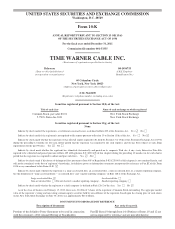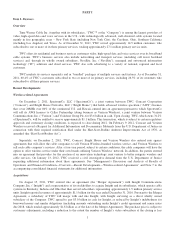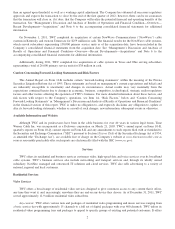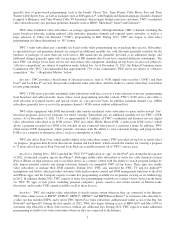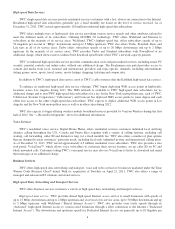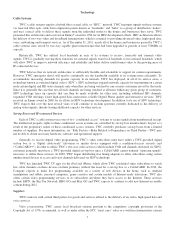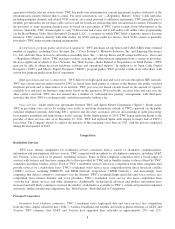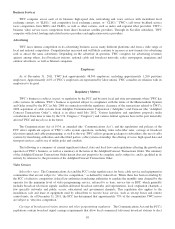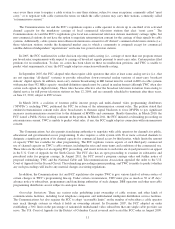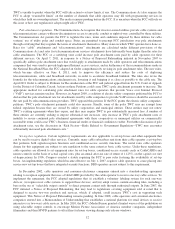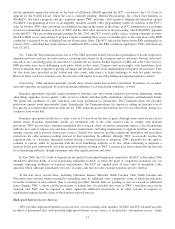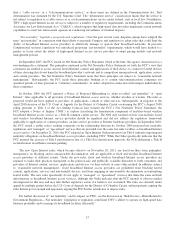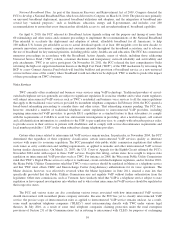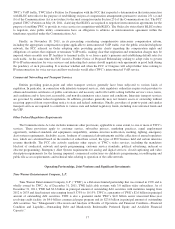Time Warner Cable 2011 Annual Report Download - page 16
Download and view the complete annual report
Please find page 16 of the 2011 Time Warner Cable annual report below. You can navigate through the pages in the report by either clicking on the pages listed below, or by using the keyword search tool below to find specific information within the annual report.agreement with the relevant station owner. TWC has multi-year retransmission consent agreements in place with most of the
retransmission consent stations that it carries. For more information, see “—Regulatory Matters” below. Cable networks,
including premium channels and related VOD content, are carried pursuant to affiliation agreements. TWC generally pays a
monthly per subscriber fee for these cable services and for broadcast stations that elect retransmission consent. Payments to
the providers of some premium channels may be based on a percentage of TWC’s gross receipts from subscriptions to the
services. Generally, TWC obtains rights to carry VOD movies and events and to sell and/or rent online video programming
via the Road Runner Video Store through iN Demand L.L.C., a company in which TWC holds a minority interest. In some
instances, TWC contracts directly with film studios for VOD carriage rights for movies. Such VOD content is generally
provided to TWC under revenue-sharing arrangements.
Set-top boxes, program guides and network equipment. TWC purchases set-top boxes and CableCARDs from a limited
number of suppliers, including Cisco Systems, Inc. (“Cisco Systems”), Motorola Solutions, Inc. and Samsung Electronics
Co., Ltd. and rents these devices to subscribers at monthly rates. See “—Set-top Boxes and IP-connected Devices” above and
“—Regulatory Matters” below. TWC purchases routers, switches and other network equipment from a variety of providers,
the most significant of which is Cisco Systems. See “Risk Factors—Risks Related to Dependence on Third Parties—TWC
may not be able to obtain necessary hardware, software and operational support.” In addition to its Open Cable Digital
Navigator (“ODN”) and Mystro Digital Navigator (“MDN”) program guides, TWC provides certain of its subscribers with
set-top box program guides from Rovi Corporation.
High-speed data and voice connectivity. TWC delivers its high-speed data and voice services through its HFC network.
TWC uses circuits that are either owned by TWC or leased from third parties to connect to the Internet, the public switched
telephone network and to interconnect to its network. TWC pays fees for leased circuits based on the amount of capacity
available to it and pays for Internet connectivity based on the amount of IP-based traffic received from and sent over the
other carrier’s network. TWC also has entered into a number of “settlement-free peering” arrangements with third-party
networks that allow TWC to exchange traffic with those networks without a fee.
Voice services. Under multi-year agreements between TWC and Sprint Nextel Corporation (“Sprint”), Sprint assists
TWC in providing voice service by routing voice traffic to and from destinations outside of TWC’s network via the public
switched telephone network, delivering E911, operator and directory assistance services and assisting in order processing,
local number portability and long-distance traffic carriage. In the fourth quarter of 2010, TWC began replacing Sprint as the
provider of these services and, as of December 31, 2011, TWC had replaced Sprint with respect to nearly half of TWC’s
voice lines. The Company expects to replace the majority of the remaining voice lines in 2013, with the process completed
during the first quarter of 2014.
Competition
Residential Services
TWC faces intense competition for residential services customers from a variety of alternative communications,
information and entertainment delivery sources. TWC competes with incumbent local telephone companies, including AT&T
and Verizon, across each of its primary residential services. Some of these telephone companies offer a broad range of
services with features and functions comparable to those provided by TWC and in bundles similar to those offered by TWC,
sometimes including wireless service. Each of TWC’s residential services also faces competition from other companies that
provide services on a stand-alone basis. TWC’s residential video service faces competition from direct broadcast satellite
(“DBS”) services, including DIRECTV and DISH Network Corporation (“DISH Network”), and increasingly from
companies that deliver content to consumers over the Internet. TWC’s residential high-speed data and voice services face
competition from wireless Internet and voice providers. TWC’s residential voice service also faces competition from
“over-the-top” phone services and other alternatives. Additionally, technological advances and product innovations have
increased and will likely continue to increase the number of alternatives available to TWC’s current and potential residential
customers, further intensifying competition. See “Risk Factors—Risks Related to Competition.”
Principal Competitors
Incumbent local telephone companies. TWC’s residential video, high-speed data and voice services face competition
from the video, digital subscriber line (“DSL”), wireless broadband and wireline and wireless phone offerings of AT&T and
Verizon. TWC estimates that AT&T and Verizon have upgraded their networks in approximately 25% and 12%,
8



